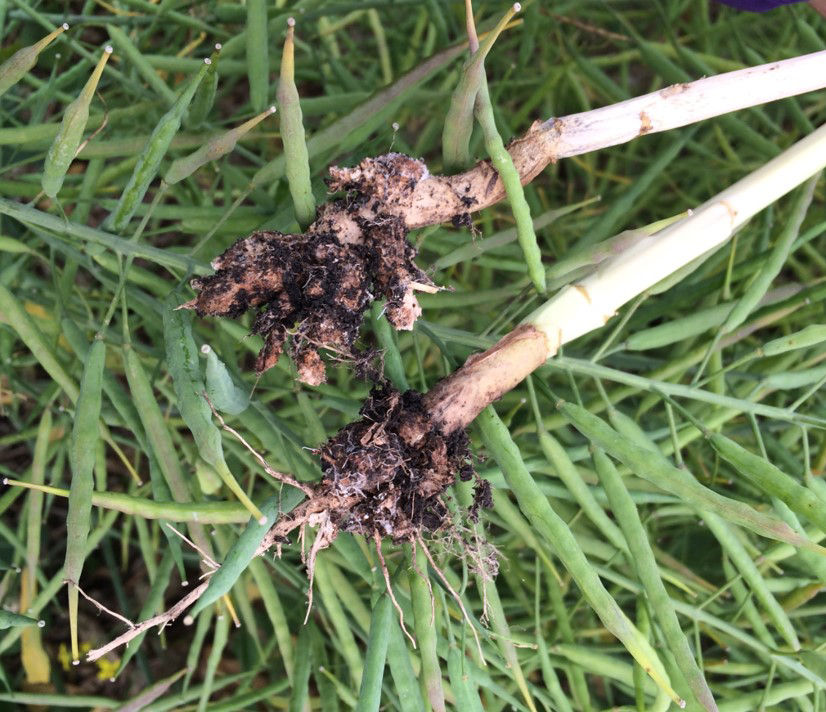5 READ-TIME
Clubroot resistant canola hybrids
July 14, 2022
Selecting canola hybrids for clubroot resistance
Q. What is clubroot disease?
Clubroot is a serious soil-borne disease of cruciferous plants, such as canola. In canola, it causes swellings or galls on the roots, which can ultimately cause premature death of the plant. It is caused by the fungus Plasmodiophora brassicae. Clubroot can reduce yield potential and quality of canola. Utilizing multiple control methods including resistant canola varieties, crop rotation, sanitation, and patch management will help with best long-term control.1
Q. What’s the role of field scouting?
Symptoms of clubroot can include wilting, stunting, reduced seed production, a thin stand and premature plant death (Figure 1). However, above-ground symptoms do not always occur and are not diagnostic of the disease. Proper diagnosis includes digging up wilted plants to check for gall formation on roots.2

Figure 1. Clubroot symptoms on canola roots.
When scouting clubroot infested fields with resistant canola varieties, if more than 10% of seeded plants (excluding volunteers) are infected, it could mean that the clubroot resistance is no longer functional against the pathogen population in the field. These infected plants may be restricted to a small patch which indicates a recent pathogen change.3
Q. What could be the reason for infected plants in clubroot-resistant field?
Growers using clubroot-resistant canola varieties in infested fields may still experience development of small galls under high disease pressure. Galls can also occur on volunteers from previous canola crops of susceptible varieties, pathotypes, and mustard family weed species and in the small percentage of off-types in hybrid seed.2
Pathotype is the proportion of pathogen population which can be differentiated based on its ability to cause disease on a different host range. Clubroot pathotypes are different than the clubroot-resistance. “Some of the clubroot-resistant (CR) varieties are highly effective against the predominant pathotypes of P. brassicae, and the presence of a CR gene in a plant does not lead to a new pathotype of clubroot being formed. Rather, a portion of the spores that are present in infested soil have the ability to overcome or “defeat” the resistance gene, as the resistance gene cannot defend against all pathotype.”1
Q. What does off-types mean?
Off-types are a normal part of hybrid canola production because no canola hybrid is 100% pure, so there may be a small proportion (1-4%) of the seed that is susceptible.
Q. What’s the Canadian approach for deploy the clubroot-resistant (CR) canola seed varieties?
Deploying of CR canola seed varieties is must to reduce selection pressure for clubroot pathogens. This can help to keep spore count as low as possible and for as long as possible. However, this practice needs to be combined with other management practices as mentioned above. Past performance of clubroot varieties data from small plots trials and field trials can help making CR seed variety selection.6 Below is the list of hybrids and management strategies which can be used based on the spore load such as no clubroot spore load, low spore load and high spore load/new virulent pathotypes.7
No clubroot spore load
- In low-risk regions, grow clubroot resistant hybrids or non-CR hybrids with an integrated clubroot management plan
- Minimize soil movement
- Clean your equipment and minimize tillage
- Lengthen crop rotation
- Scout fields especially field entrances and low spots
Low spore load
- Grow DEKALB® clubroot resistant and multi-genetic resistant hybrids
- Scout for new patches or changing pathotypes
- Minimize soil movement
- Control host weeds
- Utilize a minimum 3-year rotation to reduce spore load
High spore load or new virulent pathotypes
- Grow DEKALB® clubroot resistant and multi genetic resistant hybrids
- Continue scouting all canola fields
- Minimize soil movement
- Utilize a minimum 3-year rotation to reduce spore load
- Identify predominant pathotypes if possible7
Q. What are the effective way for clubroot management using DEKALB® canola Hybrids?
Integrated clubroot management plan that employs a variety of best management practices so to can keep ahead of clubroot disease. Most effective strategies can be used in combination with DEKALB® clubroot resistant canola hybrids to help prevent and manage clubroot on farm:
- Crop rotation: 1 in 3-year canola crop rotation (minimum 2-year break)
- Scouting: Proactive and comprehensive scouting to find and identify clubroot before it takes hold
- Minimize soil movement
- Grow clubroot resistant hybrids if clubroot is a risk in your region
- Use clubroot hybrids as a part of integrated clubroot management plan
- Control host weeds and canola volunteers
- Consider patch management strategies
- Consider lowering PH - Soil amendments (lime) to reduce infection7
Q. What kind of economic control measures are available to control this pathogen and disease?
Presently, there are no economical control measures available which can remove this pathogen from a field once it has become infested. However, it is possible to reduce the pathogen incidence and spread, and disease severity.
Q. What are the management option for canola diseases?
Growing a variety with clubroot-resistant genes is strongly encouraged if clubroot has been identified in a field. For clubroot, no variety is a ‘silver bullet’ for fields that have high levels of clubroot or where resistance in varieties has broken down. The only responsible option in that case is to not grow canola for at least 3 years.
Proper crop rotation is the best defense against clubroot and can reduce the pathogens presence. Using the proper genetics in combination with proper crop rotation makes for a best disease management program.
Management of infested fields through the combination of minimizing the risk of soil movement and using a sanitation plan, diligently scouting and record keeping, controlling host weeds and volunteer canola, utilizing clubroot-resistant varieties (and properly rotating resistance genes), practicing an effective crop rotation, and patch management techniques for infested areas are the most effective methods of controlling this disease.5
Q. What’s the Canadian approach for deploy the clubroot-resistant (CR) canola seed varieties?
Q. What recommendations farmers/pathologists can use to manage clubroot?
There are few recommendations such as DKLL 84 CRSCLL, DKTF 98 CRTF, and DKTFLL 22 CRSCTFLL suggested by seed guide to manage clubroot resistance on canola crop.7
Sources
- Canola Council of Canada, Winnipeg, MB https://www.canolacouncil.org/
- Chirumamilla et al. 2020. Scouting for clubroot of canola. Ag Hub Topics. North Dakota State University. https://www.ndsu.edu/agriculture/ag-hub/ag-topics/crop-production/diseases-pests-and-weeds/plant-diseases/scouting-clubroot-canola
- List of clubroot-resistant canola varieties. 2019. Canola Watch. https://www.canolacouncil.org/canola-watch/2019/01/10/list-of-clubroot-resistant-canola-varieties/
- Seed decision: What clubroot resistance to choose? 2020. Canola Watch. https://www.canolacouncil.org/canola-watch/2020/01/15/seed-decision-what-clubroot-resistance-to-choose/
- Clubroot disease of canola and mustard. Government of Alberta. https://www.alberta.ca/clubroot-disease-of-canola-and-mustard.aspx
- Clubroot and your 2019 seed decisions. 2018. Canola Watch. https://www.canolacouncil.org/canola-watch/2018/09/06/clubroot-and-your-2019-seed-decisions/
- DEKALB 2022 seed guide. Western Canada. https://www.cropscience.bayer.ca/en/grower-tools/resources-and-guides/dekalb-seed-guide
Legal Statements
Bayer is a member of Excellence Through Stewardship® (ETS). Bayer products are commercialized in accordance with ETS Product Launch Stewardship Guidance, and in compliance with Bayer’s Policy for Commercialization of Biotechnology-Derived Plant Products in Commodity Crops. These products have been approved for import into key export markets with functioning regulatory systems. Any crop or material produced from these products can only be exported to, or used, processed or sold in countries where all necessary regulatory approvals have been granted. It is a violation of national and international law to move material containing biotech traits across boundaries into nations where import is not permitted. Growers should talk to their grain handler or product purchaser to confirm their buying position for these products. Excellence Through Stewardship® is a registered trademark of Excellence Through Stewardship.
ALWAYS READ AND FOLLOW PESTICIDE LABEL DIRECTIONS. Performance may vary from location to location and from year to year, as local growing, soil and weather conditions may vary. Growers should evaluate data from multiple locations and years whenever possible and should consider the impacts of these conditions on the grower’s fields.
Roundup Ready® Technology contains genes that confer tolerance to glyphosate. LibertyLink® Technology contains genes that confer tolerance to glufosinate. Glyphosate will kill crops that are not tolerant to glyphosate. Glufosinate will kill crops that are not tolerant to glufosinate. Tank mixtures: The applicable labeling for each product must be in the possession of the user at the time of application. Follow applicable use instructions, including application rates, precautions and restrictions of each product used in the tank mixture. Bayer has not tested all tank mix product formulations for compatibility or performance other than specifically listed by brand name. Always predetermine the compatibility of tank mixtures by mixing small proportional quantities in advance. Bayer, Bayer Cross, DEKALB®, Roundup Ready® and TruFlex™ are trademarks of Bayer Group. Used under license. LibertyLink and the Water Droplet Design are trademarks of BASF. Used under license. LibertyLink® is a registered trademark of BASF. All other trademarks are the property of their respective owners. Bayer Crop Science Inc. is a member of CropLife Canada. ©2022 Bayer Group. All rights reserved. 2011_24301
